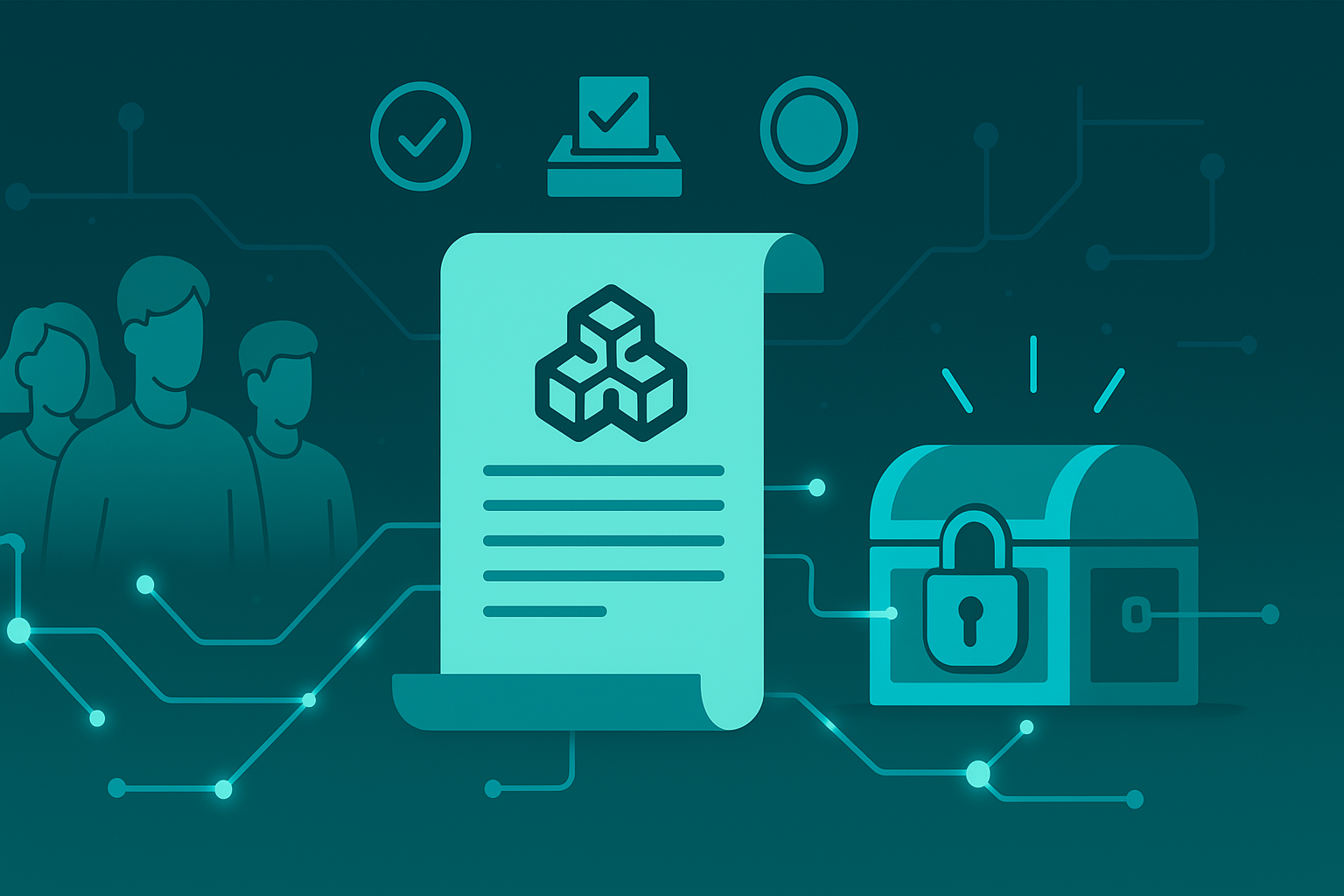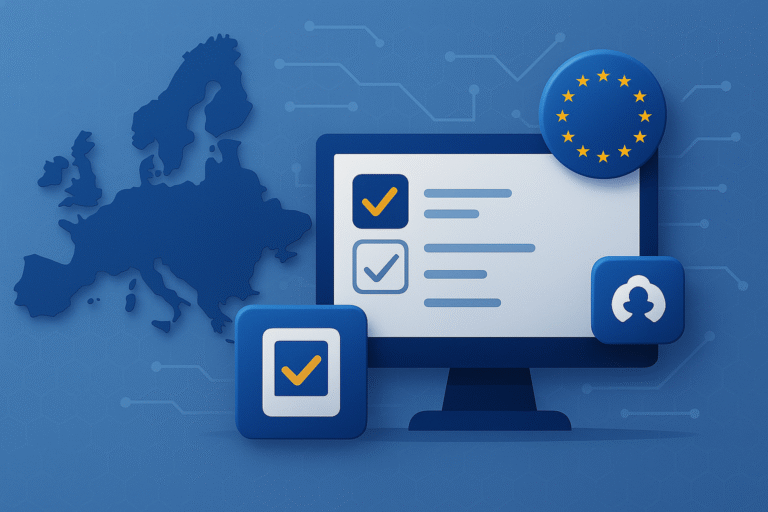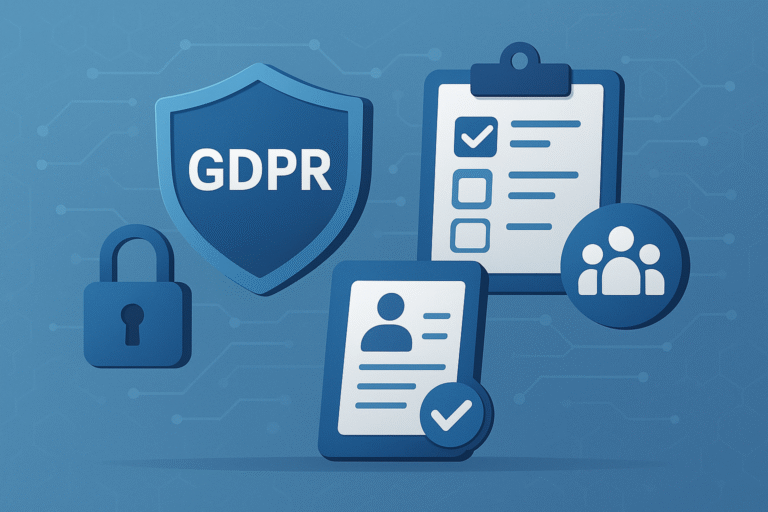
Introduction
Blockchain is increasingly used beyond cryptocurrencies—in healthcare, land registries, public finance, and civic participation. Among its most promising applications are smart contracts, programs that self-execute when predefined conditions occur, providing transparency, traceability, and automation.
In governance, this enables e-voting, DAOs, and public funds management with verifiable audit trails.
👉 For context, see also: The principles of collaborative democracy, Checklist for organizing a secure online vote, Digital ID and electronic signatures for participation.
What smart contracts are (with quick examples)
A smart contract is like an “automatic digital agreement”: if X happens, then the system executes Y. It is stored on a blockchain, making it publicly auditable and tamper-resistant.
- Car rental: the contract unlocks the smart lock only after payment is received.
- Travel insurance: if a flight is canceled, compensation is released automatically.
- P2P energy: in pilot energy communities, smart contracts settle solar exchanges and payments in real time.
Technical primer: Ethereum – Smart Contracts
Governance applications
E-voting and public consultations
- Transparency: ballots and results are traceable on a distributed ledger.
- Immutability: no retroactive tampering.
- Verifiability: independent public checks on the process.
- Efficiency: lower costs and faster tallying than manual recounts.
👉 How-to: Checklist for organizing a secure online vote
DAOs (Decentralized Autonomous Organizations)
Rules and treasuries are encoded in smart contracts; members vote (often token-weighted) and the code enforces the outcome automatically.
Decision-making & public funds
Smart contracts can make participatory budgeting and community funds binding and auditable, from decision to disbursement.
European and international public-sector cases
Estonia – public registries secured by blockchain
Since the 2000s, Estonia has used blockchain-like tech to secure health, tax, and judicial records—pioneering integrity and auditability of public data (not pure smart contracts, but foundational for trust).
Source: e-Estonia – KSI Blockchain
Sweden – land registry & real-estate conveyancing
The Land Registry (Lantmäteriet) piloted blockchain-based property transactions; smart contracts and digital workflows reduce processing time and errors.
Source: ChromaWay – Sweden Land Registry Pilot
Georgia – land titles
Blockchain land titling increases transparency and reduces fraud in property transfers, building public trust.
France – financial instruments on DLT
Experiments for recording and settling bonds on distributed ledgers; smart contracts help automate core lifecycle events.
UN (WFP) – humanitarian cash assistance
The World Food Programme used blockchain for cash-based transfers (Jordan). Going forward, smart contracts can automate eligibility, disbursement, and compliance checks.
Source: World Food Programme
Benefits
- Transparency across rules, funds, and decisions.
- Immutability of records and outcomes.
- Cost reduction (fewer intermediaries, reconciliations, delays).
- Automation of execution (less discretion, more predictability).
- Shared accountability via audit trails and codified rules.
Risks & caveats
- Code bugs: vulnerabilities can derail processes (e.g., 2016 Ethereum DAO incident).
- Power concentration: token-weighted models may favor large holders.
- Accessibility: technical complexity and the digital divide.
- Legal frameworks: evolving recognition of smart contracts and DAOs.
Read more: World Economic Forum – Smart Contracts & Governance
Links to collaborative democracy
Smart contracts turn collective decisions into operational outcomes: from votes to spending, everything becomes auditable and automatic—bridging deliberation and implementation.
👉 Related: The principles of collaborative democracy
Conclusion
Smart contracts and decentralized governance can strengthen trust, speed, and quality in public processes. To deliver on this promise, we need secure code, inclusion, and clear legal frameworks. The goal is not to replace institutions, but to make them more transparent, responsive, and effective.
Sources
- Ethereum – Smart Contracts
- e-Estonia – KSI Blockchain
- ChromaWay – Sweden Land Registry Pilot
- World Economic Forum – Smart Contracts & Governance
- OECD – Innovative Citizen Participation


